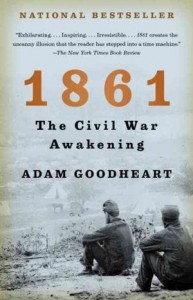I read a lot. I mean, a whole lot. That’s what historians do. Sometimes, the books pile up on me and I have a hard time staying up with them. My resolve to get through the ones I already have before buying another one always weakens when I stumble across one that seems to stand out, particularly when it might be a candidate for a text in one of my upper-level courses.
 That’s how I came to purchase and read 1861: The Civil War Awakening, an intriguing volume I finished yesterday. A good history book, for me, has to go beyond basic facts; it also has to bring historical figures to life. Yes, I know we need statistical analyses and other types of studies that concentrate on narrow slices of the historical pie. But I still prefer a really well-written story that incorporates character, plot, and theme. History is literature’s very close sister, with the major difference being that you don’t have to invent the characters or devise the plot—they await the avid researcher, already full-blown.
That’s how I came to purchase and read 1861: The Civil War Awakening, an intriguing volume I finished yesterday. A good history book, for me, has to go beyond basic facts; it also has to bring historical figures to life. Yes, I know we need statistical analyses and other types of studies that concentrate on narrow slices of the historical pie. But I still prefer a really well-written story that incorporates character, plot, and theme. History is literature’s very close sister, with the major difference being that you don’t have to invent the characters or devise the plot—they await the avid researcher, already full-blown.
Author Adam Goodheart [how’s that for a name to attract attention?] spins a spellbinding yarn, taking the reader into details he never expected to find. Goodheart understands the necessity of placing people in the midst of his tale because readers will identify better with people than abstractions. I was pleasantly surprised to be introduced to individuals I had never heard of before. Take, for instance, Ralph Farnham, the Revolutionary War veteran who, at age 104, was celebrated the year the Civil War began in 1861. Farnham serves as a link to an earlier era, connected to the age of the Founders. Yet he is still on the scene as the opening salvos of this new war are heard.
Even when Goodheart spends time with people I know, such as James Garfield, he uses them in inventive ways to shed extra light on events other authors have covered. Each chapter has either a key individual around which the theme and plot revolve or a strange occurrence that puzzles the generation that witnesses it. What about that Great Comet of 1861? It startled the world. What did it signify? Was it a sign from God? If so, did it portend a glorious future or doom? Did it mean anything at all?
I so enjoyed reading 1861 that I have decided to incorporate it into my Civil War course when I next teach it. I never will comprehend why most students have difficulty being interested in history. It’s endlessly fascinating. You have my recommendation. Check it out for yourself. Try it; you may like it.
